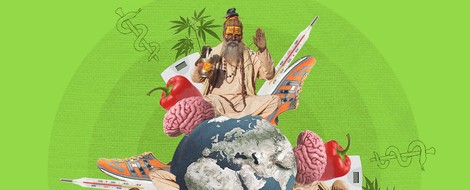Your podcast discovery platform
Curious minds select the most fascinating podcasts from around the world. Discover hand-piqd audio recommendations on your favorite topics.

piqer for: Global finds Health and Sanity Doing Good
Bangalore-based Rashmi Vasudeva's journalism has appeared in many Indian and international publications over the past decade. A features writer with over nine years of experience heading a health and fitness supplement in a mainstream Indian newspaper, her niche areas include health, wellness, fitness, food, nutrition and Indian classical Arts.
Her articles have appeared in various publications including Mint-Wall Street Journal, The Hindu, Deccan Herald (mainstream South Indian newspaper), Smart Life (Health magazine from the Malayala Manorama Group of publications), YourStory (India's media technology platform for entrepreneurs), Avantika (a noir arts and theatre magazine), ZDF (a German public broadcasting company) and others.
In 2006, she was awarded the British Print-Chevening scholarship to pursue a short-term course in new-age journalism at the University of Westminster, U.K. With a double Masters in Globalisation and Media Studies from Aarhus Universitet (Denmark), University of Amsterdam and Swansea University in Wales, U.K., she has also dabbled in academics, travel writing and socio-cultural studies. Mother to a frisky toddler, she hums 'wheels on the bus' while working and keeps a beady eye on the aforementioned toddler's antics.
Landmark Trial Sparks Excitement: Light In The Neurodegenerative Tunnel At Last
There is unusual elation about this trial; even the media reports reflect it. A landmark trial it certainly is but some trials are more equal than others. This time around it all seems justified though. Experts are even saying that it is the biggest breakthrough in neurodegenerative diseases for 50 years. It is not often that neurodegenerative diseases see any light – researchers have been ploughing through dark tunnels for decades when it comes to diseases like Huntington’s, Parkinson’s and Alzheimer’s.
Researchers at the University College London have announced that there could be a drug soon that could significantly slow down the progress of Huntington’s disease, a genetic illness that the BBC says patients describe as “Parkinson’s, Alzheimer’s and motor neurone disease rolled into one.”
The unstoppable progress of Huntington’s disease leaves patients and their families completely devastated – the death of brain cells that occurs due to the disease affects everything from movement to behaviour to cognition. Caused by a gene defect that is inherited, most patients die within a decade of diagnosis. The experimental drug that is being hailed now was injected into the spinal fluid and it successfully lowered the quantity of toxic proteins in the brain.
The trial has caused ripples of excitement the world over because of the possibility of using the same approach in other neurodegenerative diseases such as Parkinson’s and dementia. They are also believed to be caused partly due to the build-up of toxic proteins in the brain.
Groundbreaking it certainly is, but as Prof Giovanna Mallucci cautions, it is not a cure and it will still be a "big leap" to make "gene silencing" work for all neurodegenerative diseases. Nevertheless, for scientists struggling for years, it is certainly a momentous first step.
